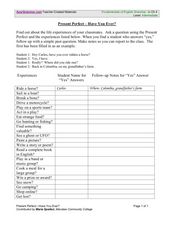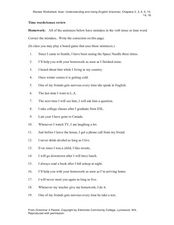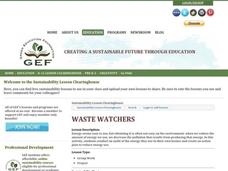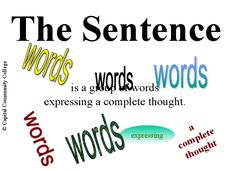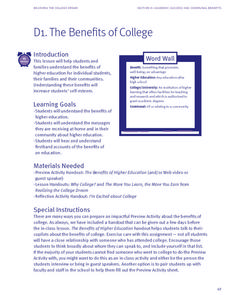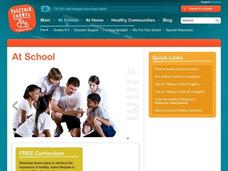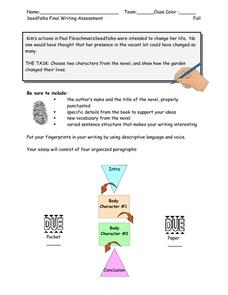Curated OER
Present Perfect – Have You Ever?
Designed for an English language development class, this worksheet is more like a treasure hunt. Learners walk around the room looking for others who have done a certain thing, like ride a horse. They use these prompts to practice asking...
Curated OER
Time Words/Tenses Review
Focus on correct verb usage with your English language learners. There are 42 sentences listed; can your class correct them? The sentences are short, and the major errors are in verb tense.
Curated OER
Poetry and Hip Hop
High schoolers compare and contrast the genres of poetry and hip-hop. They view a poetry slam and write about it in their journals. Learners view a Lauryn Hill music video and respond to it in their journals. They compare and contrast...
Curated OER
Waste Watchers
Energy-aware learners conduct an audit on their electricity usage by recording their electric meter reading and assessing the thermostat, light bulbs, windows, and water heaters in their homes. In class, they analyze results and discuss...
Curated OER
An Exploration of Wind Energy and Wind Turbines
How is wind produced and is it a good source for energy production? Get some air moving in your class. Learners take a pre-test, watch a demonstration of how electricity can be generated by wind energy, test different turbine factors for...
Curated OER
Teamwork
Teamwork is the focus of this activity. By discussing what teamwork means, learners begin to explore this topic. There are a series of slides focusing on the behavior of geese that highlight leadership and teamwork skills.
Curated OER
Character Traits
Explore character traits using this resource. After reading the story Goldilocks and the Three Bears, learners fill in a graph identifying character traits. Then, they write and put on a skit. This resource provides a motivating way to...
Curated OER
Subject and Predicate
The subject and the predicate are two vocabulary words that every young writer must know. This short, but effective, presentation aptly describes what the subject and predicate are, what role they play in a sentence, and offers some...
Curated OER
Using Opening Lines as Writing Prompts
Help your writers get started with these hooks! Twenty-five opening lines from the "Lives" column in the New York Times Magazine act as prompts for creative writing. Have your learners choose one prompt and write an original essay....
Curated OER
Do You Have a Blog?
Ask learners about their personal writing habits, such as whether they keep a journal or a blog, or if they'd ever want to. Though this is not a fully developed lesson, you can use this article and question to provoke discussion and...
Curated OER
Student Opinion: How Should Schools Address Bullying?
Spark a disscussion about a current issue, bullying, in your classroom. This resource, published by The New York Times, provides a short article discussing a Anti-Bullying Bill of Rights passed into law in the state New Jersey followed...
Curated OER
Why College?
By engaging in small and large group discussions, learners consider the importance of attending college. After discussion, small groups reconvene and create posters based on their findings.
Curated OER
Food and Energy
What is a calorie? How many calories do young people require? How many do athletes require? How many calories do adults need? Introduce learners to the calories in foods. Explain that different types of foods have different amounts of...
Curated OER
Home Living/Life Skills: Face Washing
Having good hygiene skills is a very important part of living an independent life. Learners with special needs follow sequencing cards to practice washing their faces. They follow each step in the process and discuss the importance of...
WK Kellogg Biological Station
N2O: It’s No Laughing Matter!
While the layout of the lesson is not very detailed and the link to the PowerPoint is no longer valid, there are some great exercises to examine the role of nitrous oxide in the environment. For middle level learners, the resource listed...
San Bernardino Co. Supt. of Schools
Was Julius Caesar a Good Leader for Rome?
Learners consider the various perspectives that different groups in Roman society may have had for Julius Caesar, such as Roman soldiers, senators, the working class, and slaves. The primary activity involves a reading of Caesar's...
Curated OER
Seedfolks Final Writing Assessment
Wrap up a study of Seedfolks with a final essay. Writers can draft their essays by following the steps and filling in the organizer provided here. The packet begins with a prompt, includes a few basic requirements, and provides an...
Tallahassee Community College
Finding the Main Idea
A short excerpt at the beginning of the sheet provides learners with questions to think about when looking for the main idea. Followed by that, learners respond to four reading passages by answering multiple...
Curated OER
Literacy Lesson: Guided Reading
Here is a wonderful lesson designed for young scholars with special needs. This well-thought-out lesson uses Big Books, familiar stories, and has a lot of review learning built into it. The book, The Keeping Quilt is used in the main...
Curated OER
Photography Merit Badge Workbook
Engage your class in photography with this series of activities! Beginning photographers research and explain elements of photography, camera equipment, and careers in photography. After the research portion, learners complete one of two...
Curated OER
Wildlife Conservation III
Discuss the importance of wildlife conservation. Learners talk about the animals and plants on the US Fish and Wildlife Services list of endangered and threatened species. Then, they engage in a detailed discussion of the reasons these...
Curated OER
Sentence Fragments
Tired of finding sentence fragments in your students' writing? Use this straightforward activity to help them identify when a sentence is not complete. Sixteen sentences prompt learners to rewrite fragments as parts of a complete...
Curated OER
Food for thought
Cake has to be good for something, right? Different foods are used by our bodies in different ways. Learners will first read about what fats, proteins, fruits, and vegetables do for the human body. They will then put each of food shown...
Curated OER
Funny Ears
Young scientists get a worksheet that has a picture of a dog, a donkey, a person, a mouse, a rabbit, and a cat. Each picture has the wrong ears attached to it! Learners must draw lines matching up the ears with the correct recipient. The...
